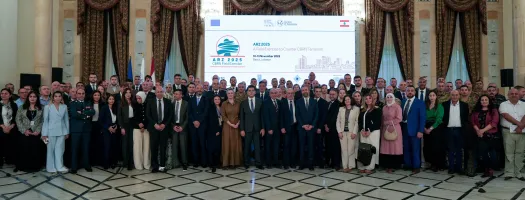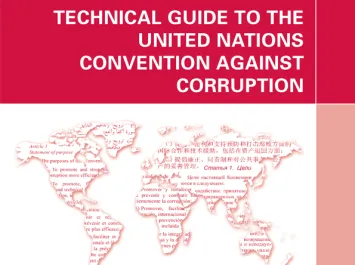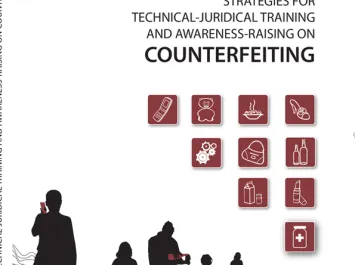Beirut, 10–13 November 2025 – The ARZ 2025 field exercise on countering chemical, biological, radiological and nuclear (CBRN) threats concluded effectively in Beirut, marking a significant milestone for Lebanon and for the European Union CBRN Centres of Excellence network. The exercise was led by the Lebanese National CBRN Commission, with co-funding from the European Union, and support from UNICRI, the On-Site Assistance Expert (OSA), and the International Science and Technology Center (ISTC).
ARZ 2025 brought together over 400 participants from 10 national institutions, who worked side by side through a complex, multi-day scenario combining a chemical mass-casualty event and a radiological security incident. The exercise tested inter-agency coordination at operational and tactical levels, with the Lebanese Armed Forces taking on a central command role, supported by civilian authorities whose contribution proved essential throughout the response.
For the first time, ARZ integrated private hospitals, expanded its forensic crime-scene component, and made extensive use of drones for reconnaissance and monitoring. A team of 20 international, regional, and national evaluators — representing organizations such as the Organisation for the Prohibition of Chemical Weapons (OPCW), the International Criminal Police Organization (INTERPOL), the European Union Agency for Law Enforcement Training (CEPOL), the Joint Research Centre (JRC) of the European Commission, and experts from Jordan, Iraq, and several Lebanese institutions — provided independent evaluation and valuable technical feedback. A full evaluation report will be drafted in the coming days, based on the evaluation team’s feedback.
A high-level visibility event was held at the Grand Serail, attended by five Lebanese ministers, the Ambassador of the European Union, representatives from the United States, France, Italy, Cyprus, and numerous foreign missions, international organizations, and project implementers. On this occasion, Lebanon publicly announced the endorsement of its second CBRN National Action Plan by decision of the Presidency of the Council of Ministers — an important political milestone.
Acknowledgements
This achievement was made possible thanks to the exceptional collaboration of all partners involved.
The Lebanese institutions demonstrated remarkable professionalism, dedication, and ownership — deploying hundreds of responders over several days, providing significant financial and logistical support, mobilizing vehicles and equipment, covering venues, accommodation for regional participants, transportation, and supporting media production. Their commitment is even more notable given the extremely challenging context Lebanon is currently facing.
The European Commission’s Service for Foreign Policy Instruments (FPI) provided essential leadership and guidance.
The OSA Expert ensured outstanding technical and evaluation coordination, acting as a trusted and highly skilled counterpart for all agencies involved.
ISTC contributed decisively to the smooth implementation of the exercise, providing timely support and ensuring excellent coordination with all service providers.
We also thank the evaluators and observers, many of whom self-funded their participation, for contributing their expertise and reinforcing the international dimension of ARZ 2025.
ARZ 2025 stands as a powerful demonstration of how national leadership, regional solidarity, and international cooperation can unite to strengthen national preparedness, bolster inter-agency response mechanisms, and contribute to a more resilient international architecture for preventing, detecting, and responding to CBRN risks.
Video by the Lebanese Army



